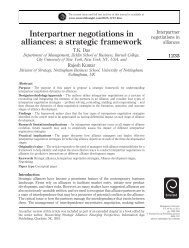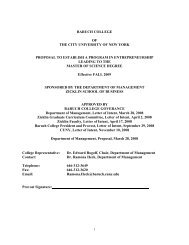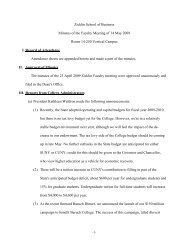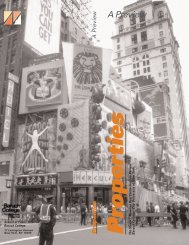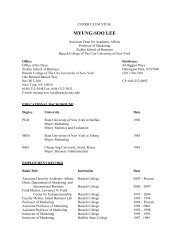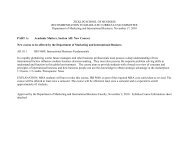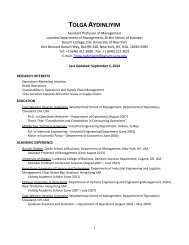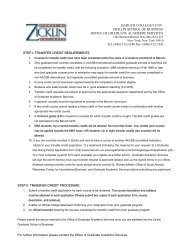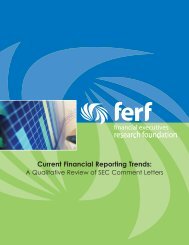Tax Seminar #3 – December 3 2012
Workbook - Zicklin School of Business
Workbook - Zicklin School of Business
You also want an ePaper? Increase the reach of your titles
YUMPU automatically turns print PDFs into web optimized ePapers that Google loves.
ulings may not be appealed prior to the close of a<br />
hearing except in extraordinary circumstances and at<br />
the discretion of the Administrative Law Judge;<br />
(3) Determine the time and place of hearing and<br />
regulate its course and conduct;<br />
(4) Adopt rules of procedure and modify the<br />
same from time to time as needed for the orderly<br />
disposition of proceedings;<br />
(5) Rule on offers of proof, receive relevant<br />
evidence, and examine witnesses;<br />
(6) Take or authorize the taking of depositions or<br />
answers to requests for admission;<br />
(7) Receive and consider oral or written argument<br />
on facts or law;<br />
(8) Hold or provide for the holding of conferences<br />
for the settlement or simplification of the issues with<br />
the consent of the parties;<br />
(9) Perform such acts and take such measures as<br />
are necessary or appropriate to the efficient conduct<br />
of any proceeding; and<br />
(10) Make decisions.<br />
(c) Effective/applicability date. This section is<br />
applicable on September 26, 2007.<br />
§ 10.71 Discovery.<br />
(a) In general. Discovery may be permitted, at the<br />
discretion of the Administrative Law Judge, only<br />
upon written motion demonstrating the relevance,<br />
materiality and reasonableness of the requested<br />
discovery and subject to the requirements of<br />
§10.72(d)(2) and (3). Within 10 days of receipt of<br />
the answer, the Administrative Law Judge will notify<br />
the parties of the right to request discovery and the<br />
timeframe for filing a request. A request for discovery,<br />
and objections, must be filed in accordance with<br />
§10.68. In response to a request for discovery, the<br />
Administrative Law Judge may order —<br />
(1) Depositions upon oral examination; or<br />
(2) Answers to requests for admission.<br />
(b) Depositions upon oral examination —<br />
(1) A deposition must be taken before an officer<br />
duly authorized to administer an oath for general<br />
purposes or before an officer or employee of the<br />
Internal Revenue Service who is authorized to<br />
Page 40 — § 10.70<br />
304<br />
administer an oath in Federal tax law matters.<br />
(2) In ordering a deposition, the Administrative<br />
Law Judge will require reasonable notice to the<br />
opposing party as to the time and place of the<br />
deposition. The opposing party, if attending, will be<br />
provided the opportunity for full examination and<br />
cross-examination of any witness.<br />
(3) Expenses in the reporting of depositions<br />
shall be borne by the party at whose instance<br />
the deposition is taken. Travel expenses of the<br />
deponent shall be borne by the party requesting the<br />
deposition, unless otherwise authorized by Federal<br />
law or regulation.<br />
(c) Requests for admission. Any party may serve<br />
on any other party a written request for admission of<br />
the truth of any matters which are not privileged and<br />
are relevant to the subject matter of this proceeding.<br />
Requests for admission shall not exceed a total of 30<br />
(including any subparts within a specific request)<br />
without the approval from the Administrative Law<br />
Judge.<br />
(d) Limitations. Discovery shall not be authorized if —<br />
(1) The request fails to meet any requirement set<br />
forth in paragraph (a) of this section;<br />
(2) It will unduly delay the proceeding;<br />
(3) It will place an undue burden on the party<br />
required to produce the discovery sought;<br />
(4) It is frivolous or abusive;<br />
(5) It is cumulative or duplicative;<br />
(6) The material sought is privileged or otherwise<br />
protected from disclosure by law;<br />
(7) The material sought relates to mental<br />
impressions, conclusions, of legal theories of any<br />
party, attorney, or other representative, or a party<br />
prepared in the anticipation of a proceeding; or<br />
(8) The material sought is available generally<br />
to the public, equally to the parties, or to the party<br />
seeking the discovery through another source.<br />
(e) Failure to comply. Where a party fails to comply<br />
with an order of the Administrative Law Judge under<br />
this section, the Administrative Law Judge may, among<br />
other things, infer that the information would be adverse<br />
to the party failing to provide it, exclude the information<br />
from evidence or issue a decision by default.<br />
(f) Other discovery. No discovery other than that<br />
Treasury Department Circular No. 230



